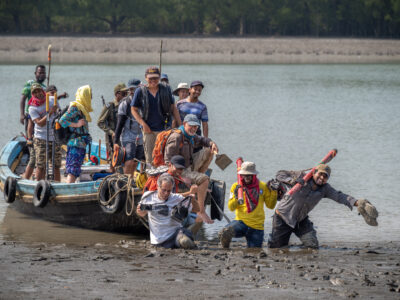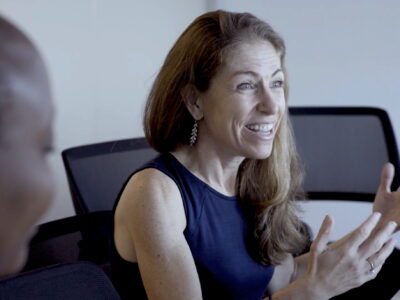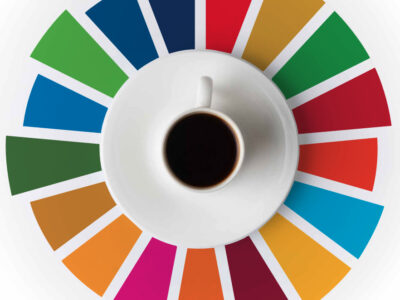
and four others not pictured will spend the next two years
working with top scientists at the Earth Institute, researching
vital aspects of sustainable development. . From
left: Christian Webersik, Michael Reilly,
Susan Doll, Murugi Ndirangu, and Rebekah Green. Photo
credit: Jill Stoddard
In 2002, Christian Webersik spent months on and off in war-torn Somalia, conducting interviews with both the elite and the layperson for his research on the link between armed conflict and natural resources.
“You can see how different political sides tried to monopolize natural resources to finance their militia,” says Webersik. His work suggests it could be more economically beneficial for autocrats to establish a state that supports institutions and infrastructure for its citizens.
Research areas like this are the realm of a new group of emerging scientists who arrived at Columbia this September as Earth Institute Fellows. These fellows will spend the next two years working with top scientists at The Earth Institute, researching vital aspects of sustainable development.
Webersik came to the Earth Institute specifically to work with Mark Levy at the Center for International Earth Science Information Network (CIESIN) on this complex connection, specifically investigating water and conflict in sub-Saharan Africa.
“This is a relatively new strand of political science, and to study it, you have to cut across different disciplines,” he says. “For such research, the Earth Institute offers a stimulating academic environment, with people who are willing to think beyond their own discipline.”
Meet the Fellows
Hailing from Germany, Kenya, Peru, the US and Canada, nine new EI Fellows join 12 returning Earth Institute Fellows in this program which began in 2002 and was started by Jeffrey D. Sachs, director of the Earth Institute.
Murugi Ndirangu, a first year Earth Institute fellow who will be conducting research on the effectiveness of community-based nutrition support programs for people living with HIV/AIDS in Kenya. Ndirangu was born in Kenya and is a graduate of Kenyatta University where she obtained her Bachelor’s and Master’s degrees. Murugi graduated with a Ph.D. in Nutrition and Food Systems from the University of Southern Mississippi. Her special interest is investigating the role of communities in designing sustainable nutrition interventions.
Roly Russell studied various aspects of the dynamics of biological diversity at Oregon State University, where he received his Ph.D. Says Russell, “My goal as an Earth Institute fellow is to illuminate some of the common facets of sustainable social responses to ecological issues. Specifically, I am interested in understanding the role that feedback cycles play in driving the sustainability of environmentally relevant social decisions such as natural resource management.”
Susan Doll received her doctoral degree in environmental health science at the Harvard School of Public Health, and also holds a master of science degree in energy systems engineering from the University of Arizona. She will be combining her experience and education in the two disciplines to explore issues related to energy and health and will be assessing technology options for reducing indoor air pollution from biomass-fueled stoves.
Franco Montalto is an engineer and hydrologist from New York City who is interested in urban water problems. His Ph.D. research at Cornell University focused on the ecological restoration of wetlands in urban coastal environments. At the Earth Institute, he hopes to utilize the experience he developed previously as a researcher and an environmental consultant to work on interdisciplinary projects that focus on urban water problems in the larger demographic contexts of urban and coastal population growth.
Vladimir Gil will be examining the political ecology of local development and transnational mining in Peru. Gil is an anthropologist with background in social sciences, environmental studies, and documentary filmmaking. His work combines the analysis of the social, political, economic and environmental impacts extractive industries have on societies, as well as their viability for projects and definitions of sustainable development. He received a Ph.D. from Yale University, and his doctoral research centered on the causes of local conflicts on proximate communities to a transnational mining project in Peru. At the Earth Institute, he plans to expand his work through more comparative and interdisciplinary perspectives, in order to understand social (dis)encounters in so-called underdeveloped countries, between private investments, environmental degradation risks and local development.
Rebekah Green will be working on the seisimically vulnerable informal housing in Gujarat, India.
Christian Webersik will study at CIESIN with Mark Levy, exploring links between drought and conflict.
Darby Jack will be working on issues of environmental economics for developing societies.
Michael Reilly will be working on modeling the spatial dynamics of global land use change.
For more information on The Earth Institute Fellows program, please visit http://earth.columbia.edu/articles/view/55.



